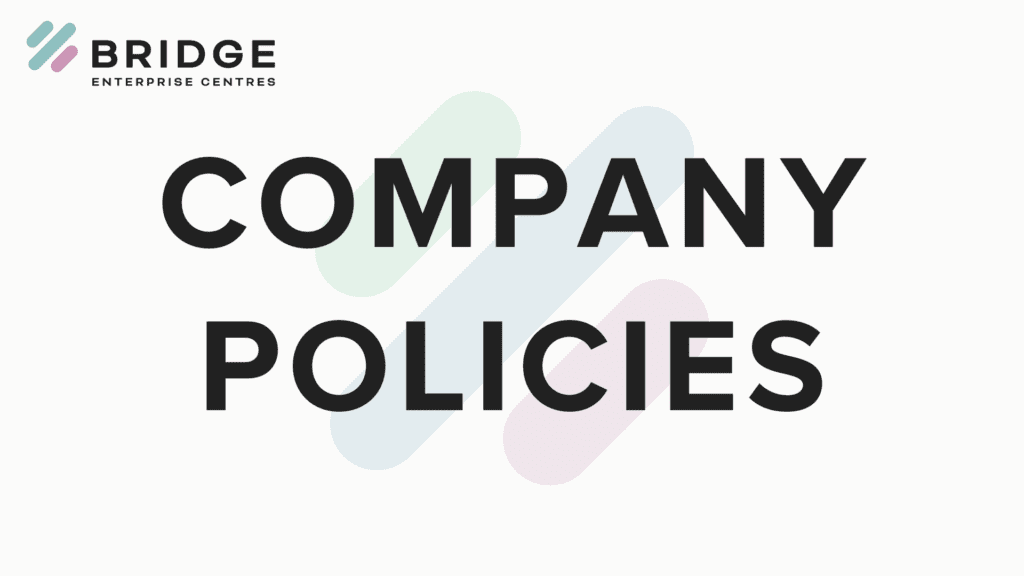
Establishing essential policies is critical to running a compliant, efficient, and sustainable business. These policies not only provide a clear framework for your daily operations but also help ensure adherence to Irish laws and foster a productive working environment. Below are some of the key policies you should have in place.
1. Health and Safety Policy
A comprehensive health and safety policy is essential for any business, particularly for those operating in industries with physical risks such as construction, agriculture, or manufacturing. In Ireland, all businesses are legally required to have a written safety statement under the Safety, Health and Welfare at Work Act 2005.
This policy should clearly outline how your business identifies, assesses, and controls risks in the workplace. It should also include procedures for dealing with emergencies, training staff in safe work practices, and ensuring the proper use of equipment. Having such a policy in place not only protects your employees but also safeguards your business from potential legal issues and compensation claims.
2. Employee Handbook and HR Policies
A well-structured employee handbook provides guidance on the rights and responsibilities of both employers and employees. This should include clear policies on topics such as working hours, leave entitlements, performance reviews, and disciplinary procedures.
Irish employment law, particularly the Employment (Miscellaneous Provisions) Act 2018, emphasises transparency in the employment relationship, including the provision of a written statement of terms within five days of hiring. Your HR policies should also cover equal treatment in line with the Employment Equality Acts 1998-2015, ensuring that all employees are treated fairly regardless of their background.
3. Data Protection Policy
If you operate in Ireland, your business is subject to the General Data Protection Regulation (GDPR), which places stringent requirements on how your business handles personal data. A data protection policy is essential for ensuring compliance with these regulations. This policy should detail how your business collects, stores, processes, and deletes personal data. It must also provide information on individuals’ rights to access and correct their data, as well as the procedures in place for handling data breaches.
Small businesses, despite their size, are not exempt from GDPR. A well-implemented data protection policy helps build trust with your customers and employees, demonstrating the company’s commitment to privacy and security.
4. Environmental Policy
Sustainability is becoming increasingly important for Irish businesses, as customers and stakeholders are more concerned about environmental impact. An environmental policy outlines your business’s approach to reducing waste, conserving energy, and promoting eco-friendly practices.
Even simple measures such as reducing paper usage, opting for energy-efficient equipment, and minimising carbon emissions can make a significant difference. Having an environmental policy not only aligns with Ireland’s national goals for reducing greenhouse gas emissions but also attracts environmentally conscious customers.
5. Cybersecurity Policy
As Irish businesses continue to digitalise, the threat of cyberattacks grows. A cybersecurity policy is crucial for protecting your sensitive data, IT infrastructure, and digital assets. This policy should detail how your employees handle passwords, data encryption standards, and how you should respond to potential breaches.
Even small businesses are at risk of cyber threats, and the consequences of a data breach can be devastating, from financial losses to reputational damage. A strong cybersecurity policy mitigates these risks and ensures employees are vigilant about safeguarding digital information.
6. Financial Management Policy
A sound financial management policy helps your business maintain fiscal discipline and control. This policy should address how the business manages its cash flow, sets budgets, and ensures that financial reporting is accurate and timely.
You should ensure your financial policies include tax compliance procedures, VAT handling, and payroll management. Strong financial policies will also help you remain solvent and prepared for economic challenges.
7. Equality and Diversity Policy
An equality and diversity policy ensures that all your employees are treated fairly and without discrimination, in line with Irish law, particularly the Employment Equality Acts. This policy is essential for promoting an inclusive workplace, where differences in race, gender, religion, or ability are respected and valued.
Such a policy not only fosters a positive working environment but also ensures that your business complies with legal obligations regarding equal treatment in employment. A diverse workforce can bring new perspectives and ideas, which is vital for innovation and business growth.
8. Customer Service Policy
Maintaining strong relationships with customers is key to long-term success. A customer service policy outlines how your business handles queries, complaints, and customer interactions. It ensures consistency in how your customers are treated and provides clear guidelines for resolving disputes efficiently and fairly.
This policy should also highlight the business’s commitment to providing high-quality products or services, fostering customer loyalty and satisfaction, which is critical for growth, especially in competitive markets.
9. Supplier and Procurement Policy
Your business may often rely on local suppliers to maintain operations. A supplier and procurement policy helps your businesses manage relationships with suppliers, ensuring that you get the best value for money and that ethical considerations, such as fair labour practices and environmental sustainability, are factored into purchasing decisions.
This policy should define how your suppliers are chosen, how contracts are managed, and how supplier performance is evaluated. It helps your businesses maintain quality control and ensures that procurement decisions align with your company’s values and goals.
In conclusion, having robust policies in place is essential for your businesses. These policies not only ensure compliance with Irish laws and regulations but also foster a positive work culture, enhance customer satisfaction, and promote sustainable growth. By implementing these key policies, your business can manage risks effectively and position yourself for long-term success.
As always, consult a professional for advice.









